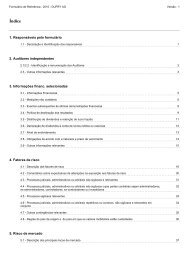DUFRY AG Listing of 4,218,750 Registered Shares
DUFRY AG Listing of 4,218,750 Registered Shares
DUFRY AG Listing of 4,218,750 Registered Shares
You also want an ePaper? Increase the reach of your titles
YUMPU automatically turns print PDFs into web optimized ePapers that Google loves.
The retail business is highly competitive.<br />
Dufry also competes to attract retail customers. As Dufry’s sales <strong>of</strong> non-traditional duty-free products<br />
increases, Dufry must compete with other, non-airport retailers, such as ‘High Street’ retailers. Some <strong>of</strong> Dufry’s<br />
retail competitors may have greater financial resources, greater purchasing economies <strong>of</strong> scale and/or lower cost<br />
bases, any <strong>of</strong> which may give them a competitive advantage over Dufry. If Dufry were to lose market share to<br />
competitors, its revenues would be reduced and its business, financial condition and results <strong>of</strong> operations<br />
adversely affected. See “Business—Competition.”<br />
Dufry relies on a limited number <strong>of</strong> suppliers.<br />
Dufry relies on a small number <strong>of</strong> suppliers for the majority <strong>of</strong> its purchases in each major product<br />
category. Future consolidation may reduce Dufry’s number <strong>of</strong> suppliers even further. As a result, Dufry’s<br />
suppliers may have increased bargaining power and Dufry may be required to accept less favorable purchasing<br />
terms. In addition, in the event <strong>of</strong> a dispute with any supplier, the delivery <strong>of</strong> a significant amount <strong>of</strong><br />
merchandise may be delayed or cancelled, or the Company may be forced to purchase merchandise from other<br />
suppliers on less favorable terms. Such events could cause revenues to fall and costs to increase, adversely<br />
affecting the Company’s business, financial condition and results <strong>of</strong> operations.<br />
Dufry has operations in emerging markets which exposes it to risks inherent to such less developed<br />
markets.<br />
Dufry has operations in a number <strong>of</strong> emerging markets. Business climates in these countries expose the<br />
Dufry Group to a variety <strong>of</strong> greater political, economic, legal and social uncertainties than countries with more<br />
developed institutional structures, and the risk <strong>of</strong> loss resulting from changes in law, economic and social<br />
upheaval and other factors may be substantial. Among the more significant risks <strong>of</strong> operating and investing in<br />
emerging market countries are those arising from interruption <strong>of</strong> operations due to political or social instability,<br />
the establishment or enforcement <strong>of</strong> foreign exchange restrictions, which could effectively prevent Dufry from<br />
repatriating pr<strong>of</strong>its, liquidating assets or withdrawing from one or more <strong>of</strong> these countries. Furthermore, changes<br />
in tax regulations or enforcement mechanisms could substantially reduce or eliminate any revenues and pr<strong>of</strong>its<br />
derived from operations in these countries and reduce significantly the value <strong>of</strong> assets related to such operations.<br />
Another aspect <strong>of</strong> certain emerging markets is the inadequacy <strong>of</strong> the legal system and law enforcement<br />
mechanism, which leaves Dufry exposed to the possibility <strong>of</strong> considerable loss as a result <strong>of</strong> abusive practices<br />
by competitors, parties with which it contracts or others.<br />
Exchange rate fluctuations may have a material negative effect on Dufry’s business, financial condition<br />
and results <strong>of</strong> operations.<br />
Dufry faces two types <strong>of</strong> exchange rate risk. Firstly, it faces transaction exposure: a certain amount <strong>of</strong> its<br />
sales are denominated in the currencies <strong>of</strong> the countries in which it operates, while its related costs and expenses<br />
are primarily denominated in US dollars or Euro, and vice versa. Therefore, significant movements in currency<br />
rates may have an adverse effect on its business, financial condition and results <strong>of</strong> operations. In Brazil, for<br />
instance the product pricing is done in US dollars. A depreciation <strong>of</strong> the Brazilian real leads to a diminished<br />
purchase power <strong>of</strong> local customers, whereas an appreciation strengthens the Brazilian’s purchase power. Some<br />
fix costs are denominated in Brazilian reais. Thus, any fluctuations in the value <strong>of</strong> the Brazilian real versus the<br />
US dollar can adversely affect Dufry’s Brazilian business, its financial condition and results <strong>of</strong> operations.<br />
The second type <strong>of</strong> risk is the translation exposure, which arises as a result <strong>of</strong> Dufry’s reporting in Swiss<br />
Francs, while a major part <strong>of</strong> its assets and liabilities are denominated in currencies other than the Swiss Franc.<br />
E.g., in the first half <strong>of</strong> 2008, Dufry’s turnover increased by 15.3 percent in comparison to the first half <strong>of</strong> 2007<br />
measured on constant foreign exchange rates, but the negative foreign exchange accounting effects <strong>of</strong> 11.1<br />
percent mainly related to the translation <strong>of</strong> the weakening US dollar against the Swiss Franc resulted in a<br />
turnover growth <strong>of</strong> only 4.2 percent relative to the first six months 2007. Therefore, increases and decreases in<br />
the value <strong>of</strong> the Swiss Franc against other currencies may affect operating and financial results and cash flows,<br />
and the value <strong>of</strong> its assets and liabilities as reported in its consolidated financial statements.<br />
15





